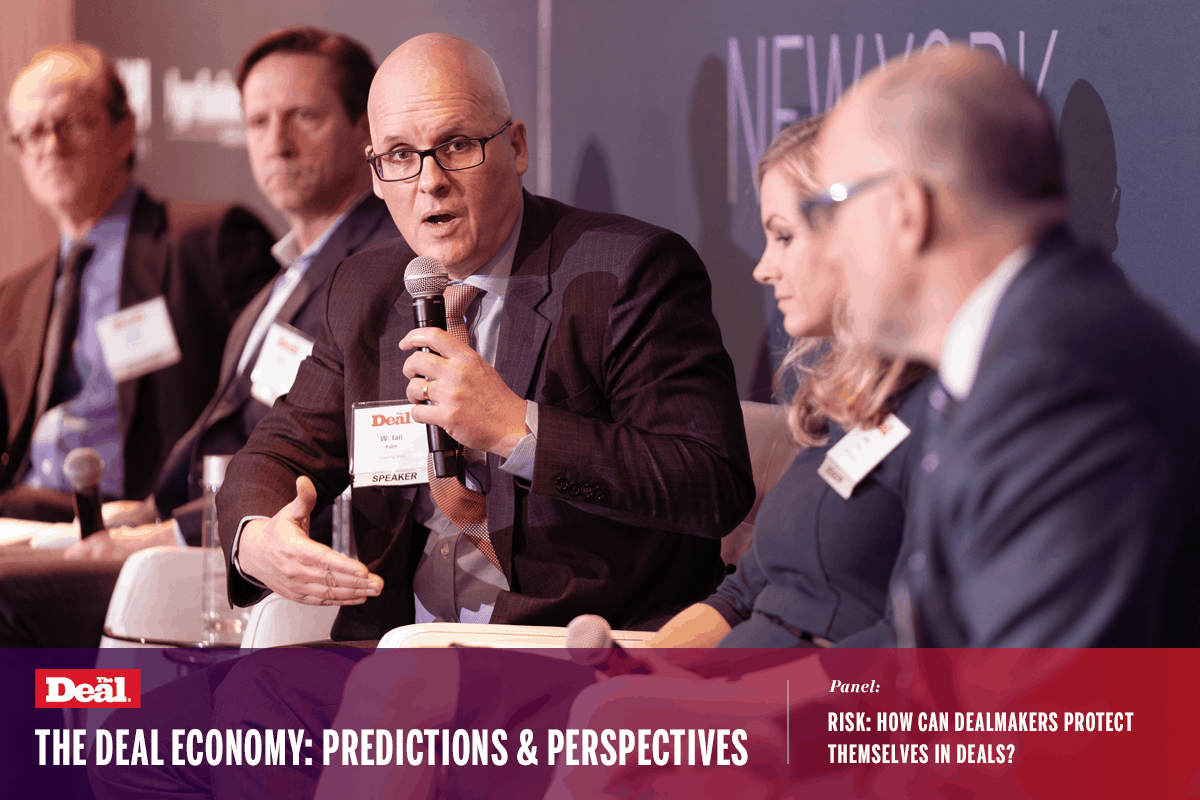
Exhaustive due diligence, whether leading up to a transaction’s announcement or close or even before entering an auction, is particularly necessary to mitigate risk in today’s M&A dealmaking, panelists stressed at The Deal Economy Conference in New York on Wednesday, Nov. 20.
“When we are looking at deals we come up with a set of criteria in terms of what an acquisition would look like that we would even do due diligence on,” Amy Rice of Oaktree Capital Management LP. “We are very intentional about each piece of due diligence. Whether it’s when we are outsourcing part of the due diligence process, such as industry reports, or vendor information, we will interview each party on the source.”
Rice, who is part of Oaktree’s special situations group, said her firm mitigates risk in deals both in the types of transactions they target and the way in which they structure them.
“We don’t get involved in many auctions,” she said, adding that the firm has a three-pronged approach in the special situations group, targeting distress for control, structured equity (debt and warrants) and buy-and-build strategies.
Mitigating risk, she said, is most important in the buy-and-build strategy where running into potential problems is most likely.
Brian Walters, Matthews International Corp.’s general counsel, told the gathering that due diligence is especially critical in deals outside the U.S. Matthews has completed more than 70 deals since Walters took the GC post at the Pittsburgh-based company in 2005, many of them outside the United States.
“We really diligence the target company, all of the people they use, and we also try to understand the market that we are going into,” Walters said.
He pointed out, however, that much of the process involves evaluating how significant a risk is. “There are two parts to due diligence,” Walters said, “understanding the red flags and knowing what is material and what’s not.”
Walters gave attendees a play-by-play of the company’s various acquisition strategies for its three main business lines: brand solutions and packaging, casket manufacturing and automation in manufacturing. Brand solutions and packaging, he said, is Matthew’s largest segment and its most global.
Once due diligence is completed and parties are ready to ink a merger agreement, challenges remain.
Walters used Matthews’ entrance into the casket business in 2001 with the acquisition of manufacturer The York Group Inc. as a prime example of how things can go awry even after a deal in signed. He explained that in the first few years of ownership, York struggled as Matthews grappled with shifting York’s strategy from direct-to-vendor to direct-to-customers.
To help expedite the shift, the company acquired New York-based South Brooklyn Casket Co., a family-owned company with a proven track record selling direct to customers. To incentize the new company to help spur change, Matthews offered management an earnout.
The family owners of the company, the Pontones, ended up suing Matthews over various parts of the agreement and the two parties eventually settled.
“We simply won’t do earnouts anymore,” Matthews International’s Walters said.
“If you don’t have the resources [to do an earnout], don’t do it,” added W. Ian Palm, a partner at Toronto-based law firm Gowling WLG. He said there are other mechanisms acquirers can use to keep management teams invested, such as minority stakes for management or options.
Another mechanism that is used increasingly to mitigate risk is M&A representations and warranties insurance, a type of insurance that helps protect against losses arising due to the seller’s breach of certain covenants of the acquisition agreement. It’s a tool typically used by private equity firms and their advisers but is also making deeper inroads into strategics’ thinking, as well.
“It used to be law firms that came to us almost exclusively,” said James Batson, an investment manager and legal counsel at Bentham IMF, a litigation finance company. “These days, it’s the companies that are coming to us.”
Editor’s note: The original version of this article was published earlier on The Deal’s premium subscription website. For access, log in to TheDeal.com or use the form below to request a free trial.



